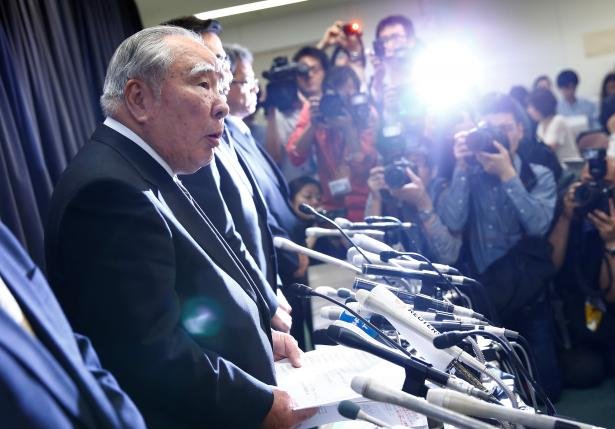Japan's transport ministry ordered widespread checks to industry methods after Mitsubishi Motors admitted last month it manipulated fuel economy data for at least four mini-vehicle models, overstating their efficiency.
Mitsubishi Motors' president, Tetsuro Aikawa, said on Wednesday he would step down over that scandal, becoming the first senior departure since it broke, battering the company's reputation and wiping billions off its market value.
Worries over similar damage for Suzuki sent shares in Japan's fourth-largest carmaker down as much as 15 percent during the day.
Suzuki said it would continue selling its mini-cars and saw no impact on its earnings. The correct readings, it said, were not significantly different to those it submitted.
Japanese authorities, however, have asked for further details from Suzuki before May 31, calling its use of non-compliant tests "outrageous".
"The company apologizes for the fact that we did not follow rules set by the country," CEO Osamu Suzuki told reporters, adding 2.1 million vehicles were affected.
The company denied using the tests to make its fuel economy data look better. It blamed the decision to cobble together readings from individual car parts - rather than a single reading - on its windy testing location on a coastal hill that made readings erratic. The individual parts were tested indoors, it said.
Suzuki specializes in mini-vehicles, which have engines of up to 660cc and get preferential tax treatment under Japanese law. It has roughly a third of the country's mini-vehicle market. It also has a successful Indian subsidiary, Maruti Suzuki (MRTI.NS).
MITSUBISHI'S WOES
The transport ministry, which had asked all automakers operating in Japan to re-submit fuel economy readings on all models by Wednesday, said no other carmakers had manipulated data or used improper tests.
It is still awaiting further detail, however, from Suzuki. It said it has yet to decide whether to penalize Mitsubishi Motors and, if so, by how much.
Mitsubishi Motors' admission that it cheated on the fuel economy tests is its third major scandal in under two decades, and has prompted the automaker to agree to sell a one-third controlling stake to Nissan Motor Co (7201.T).
At a press conference on Wednesday, Mitsubishi Motors blamed excessive pressure, less time spent on research and development and high expectations for fuel efficiency.
"There was no direct order from top management," CEO Osamu Masuko said. "But top management did not have a firm grasp on the proceedings at the R&D department." He said there were several chances for the company to stop its workers - but it did not.
Masuko, who has been at the helm of Mitsubishi Motors since 2005, has been named by Nissan boss Carlos Ghosn as Mitsubishi Motors' "pilot".
UNDER SCRUTINY
Emissions and fuel economy have come under increasing scrutiny from regulators globally after Volkswagen (VOWG_p.DE) admitted last year it used "defeat devices" on 11 million diesel vehicles to lower emissions during tests.
France, which ordered tests on a random sample of about 100 diesel cars last year, has said some vehicles made by Renault (RENA.PA), Fiat (FCHA.MI), Mercedes (DAIGn.DE), VW, PSA Peugeot Citroen (PEUP.PA), Nissan, Opel (GM.N) and Ford (F.N) failed to comply fully with its emissions regulations.
South Korea, which has tested 20 diesel vehicle models, said on Monday it would punish Nissan with a fine and a recall of its Qashqai diesel sport utility vehicles, accusing it of manipulating emissions. Nissan denied the allegation.
In the United States, the Justice Department is investigating Daimler, the maker of Mercedes vehicles, over emissions testing.
(Reporting by Minami Funakoshi, Maki Shiraki, and Chris Gallagher, with additional reporting by Joshua Hunt; Writing by Miyoung Kim; Editing by Ian Geoghegan)
Nouvelles connexes



